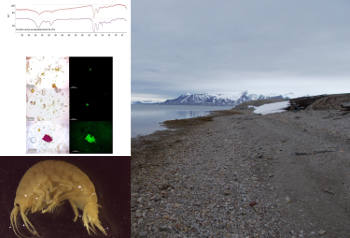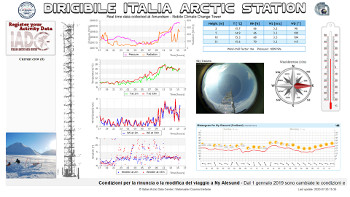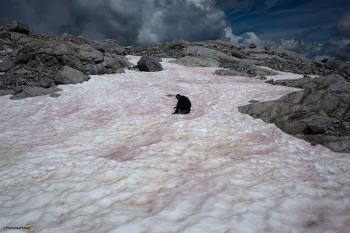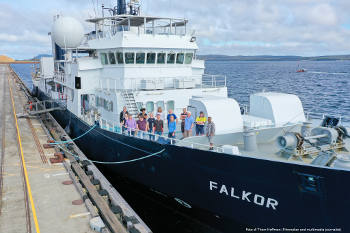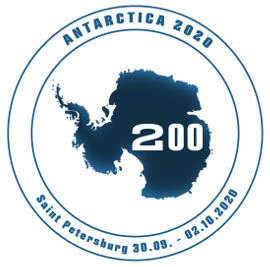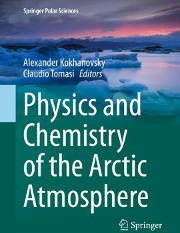Gregoris Elena
 She mainly deals with the development of analytical methods for the determination of legacy and emerging organic pollutants, in various environmental matrices. Among the areas of interest are the air quality, the analysis of pollutants in gas chromatography-mass spectrometry, the determination of microplastics, the application of statistical techniques for the evaluation of pollution sources. She has worked on several European projects, managed collaborations for research activities also with private companies, has been a correlator of various theses. She studied in Venice, where she obtained a bachelor’s degree in chemistry in 2005 and a master’s degree in chemistry and environmental Compatibility in 2007, both with full grades. In 2011 she obtained the double degree of Doctor of Philosophy in Chemical Sciences at the Ca' Foscari University of Venice and of Biological Sciences, at the Universidade Estadual Paulista of Botucatu (San Paolo - Brasile). During her doctorate, she focused mainly on antioxidant power analysis in foods, including fruit and propolis. Between 2009 and 2010 she spent a period of 6 months at the Institute of Biosciences of the University of São Paulo, working mainly on fruits originating from the tropical zone of Brazil and poorly studied until then. From 2012 to 2017 she was a research fellow at the Institute for the Dynamics of Environmental Processes (IDPA-CNR), in 2017-2018 a research technologist of the ECOMOBILITY project at the University of Ca' Foscari Venice and from July 2019 a researcher of the III level at CNR-ISP.
She mainly deals with the development of analytical methods for the determination of legacy and emerging organic pollutants, in various environmental matrices. Among the areas of interest are the air quality, the analysis of pollutants in gas chromatography-mass spectrometry, the determination of microplastics, the application of statistical techniques for the evaluation of pollution sources. She has worked on several European projects, managed collaborations for research activities also with private companies, has been a correlator of various theses. She studied in Venice, where she obtained a bachelor’s degree in chemistry in 2005 and a master’s degree in chemistry and environmental Compatibility in 2007, both with full grades. In 2011 she obtained the double degree of Doctor of Philosophy in Chemical Sciences at the Ca' Foscari University of Venice and of Biological Sciences, at the Universidade Estadual Paulista of Botucatu (San Paolo - Brasile). During her doctorate, she focused mainly on antioxidant power analysis in foods, including fruit and propolis. Between 2009 and 2010 she spent a period of 6 months at the Institute of Biosciences of the University of São Paulo, working mainly on fruits originating from the tropical zone of Brazil and poorly studied until then. From 2012 to 2017 she was a research fellow at the Institute for the Dynamics of Environmental Processes (IDPA-CNR), in 2017-2018 a research technologist of the ECOMOBILITY project at the University of Ca' Foscari Venice and from July 2019 a researcher of the III level at CNR-ISP.
Scopus - Author ID: 26649910100 ResearchGate Google Scholar
Gabrieli Jacopo
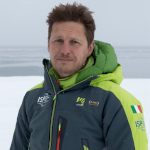 I studied chemistry at the University of Padua and obtained a doctorate in Environmental Sciences from the universities of Venice and Grenoble. Researcher at the Institute of Polar Sciences of the CNR, for years I’ve been involved in the study of climatic archives in ice cores with the implementation of innovative analytical techniques. Mountaineer for work but above all for passion, I’ve participated in important research projects not only on Alpine glaciers, but also in Greenland, Antarctica and Svalbard Islands.
I studied chemistry at the University of Padua and obtained a doctorate in Environmental Sciences from the universities of Venice and Grenoble. Researcher at the Institute of Polar Sciences of the CNR, for years I’ve been involved in the study of climatic archives in ice cores with the implementation of innovative analytical techniques. Mountaineer for work but above all for passion, I’ve participated in important research projects not only on Alpine glaciers, but also in Greenland, Antarctica and Svalbard Islands.
Scopus - Author ID: 36007295400 ResearchGate
De Biasio Francesco
 Graduated in Physics in 1993, he is currently researcher at the National Research Council, Institute of Polar Sciences (CNR-ISP). He has over 20 years of experience in the field of marine meteorology at the micro- and meso-scale, through the use of remote sensing with active microwave instruments in the marine environment, on satellite and on observation platforms during campaigns at sea (Adriatic Sea: Acqua Alta tower, platforms ENI; Kikeneiz research platform on the Black Sea).
Graduated in Physics in 1993, he is currently researcher at the National Research Council, Institute of Polar Sciences (CNR-ISP). He has over 20 years of experience in the field of marine meteorology at the micro- and meso-scale, through the use of remote sensing with active microwave instruments in the marine environment, on satellite and on observation platforms during campaigns at sea (Adriatic Sea: Acqua Alta tower, platforms ENI; Kikeneiz research platform on the Black Sea).
He deals with analyzing historical series of meteorological-marine data acquired both through in situ and remote sensing data. He is co-author of some works on wind characterization at the air-sea interface through the analysis of SAR images with the continuous wavelets technique. He participated in the MIUR RITMARE project dealing with the acquisition and interpretation of remote sensing scatterometric data for the determination of the wind at the sea surface.
He participated in the ESA eSurge-Venice project on the expansion of the possibility of using satellite data to predict storm surges. Recently he has carried out research in the ESA Sea Level Climate Change Initiative (SL_CCI), in carrying out the ESA SL_CCI Bridging Phase project, dealing with applications of satellite altimetry.
He participates in the ESA Radar Altimetry for the Coastal Zone and Inland Waters project, which involves the development of specific applications of SAR satellite altimetry in coastal areas and inland waters.
He has been the scientific manager of three research projects funded by the Tide Forecasting and Reporting Center (Municipality of Venice). His main scientific interests include microwave remote sensing of the marine environment and the interpretation of synthetic aperture radar images; continuous wavelet transformation techniques; time series analysis of wind, sea level and backscatter radar; storm surge forecasts; complementarity of atmospheric modeling and satellite remote sensing. He is the author/co-author of more than 30 indexed products (source Scopus) as articles published in international journals or as acts of international conferences. Its scientific production can be quantified by a number of citations equal to 242 and an h-index equal to 9 (source Scopus).
Scopus - Author ID: 6603102453 ![]() http://orcid.org/0000-0002-6250-9588
http://orcid.org/0000-0002-6250-9588
Cozzi Giulio
 Research interests
Research interests
Development of mass spectrometry-based advanced analytical methodology for trace and ultra-trace determinations in environmental, biological and agrifood matrices; long-term paleoclimate and atmospheric chemistry from ice cores; heavy metals in polar and temperate ice and snow.
Scopus - Author ID: 35495278300 ![]() http://orcid.org/0000-0001-8796-4176 ResearchGate Google Scholar
http://orcid.org/0000-0001-8796-4176 ResearchGate Google Scholar
Corami Fabiana
 Researcher; her main fields of research are quantification and identification of small microplastics (1-100 µm) in different environmental matrices (permafrost, biota, sediments, etc.) via MicroFTIR, quantification and identification of microplastic fibers via MicroFTIR, speciation of trace elements in Antarctic waters, geospeciation of trace elements and REEs in sediments and soils, bioaccumulation of trace elements and REEs in feathers, microscopical techniques and ancillary analyses. Author of several peer-reviewed articles, she has participated to national and international congresses and is reviewer for journals such as STOTEN (Science of the Total Environment) Estaurine Coastal and Shelf Science, International Journal of Environmental Pollution and Remediation, Scientific Reports Nature. She is member of the Scientific Committee of ICEPR – International Conference on Environmental Pollution and Remediation. She is member of the Institute Committee (CdI) and she is also CNR representative on the Executive Board of District of Venice Research and Innovation (DVRI) and is member of the Leonardos group for Science Gallery Venice.
Researcher; her main fields of research are quantification and identification of small microplastics (1-100 µm) in different environmental matrices (permafrost, biota, sediments, etc.) via MicroFTIR, quantification and identification of microplastic fibers via MicroFTIR, speciation of trace elements in Antarctic waters, geospeciation of trace elements and REEs in sediments and soils, bioaccumulation of trace elements and REEs in feathers, microscopical techniques and ancillary analyses. Author of several peer-reviewed articles, she has participated to national and international congresses and is reviewer for journals such as STOTEN (Science of the Total Environment) Estaurine Coastal and Shelf Science, International Journal of Environmental Pollution and Remediation, Scientific Reports Nature. She is member of the Scientific Committee of ICEPR – International Conference on Environmental Pollution and Remediation. She is member of the Institute Committee (CdI) and she is also CNR representative on the Executive Board of District of Venice Research and Innovation (DVRI) and is member of the Leonardos group for Science Gallery Venice.
Scopus - Author ID: 7801412352 ![]() http://orcid.org/0000-0002-7484-9600 ResearchGate Google Scholar
http://orcid.org/0000-0002-7484-9600 ResearchGate Google Scholar
Cester Valentina
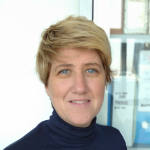 Diploma of technical-tourist maturity. 1992-1998: research support activities at the Ca' Foscari University, Department of Environmental Sciences, with freelance work contracts. 1998-2011: permanent position, as technician, at the Ca' Foscari University, Department of Environmental Sciences.
Diploma of technical-tourist maturity. 1992-1998: research support activities at the Ca' Foscari University, Department of Environmental Sciences, with freelance work contracts. 1998-2011: permanent position, as technician, at the Ca' Foscari University, Department of Environmental Sciences.
She was assigned, by convention, to the Institute for the Dynamics of Environmental Processes of the CNR (IDPA), formerly Centre of Study on Chemistry and Technologies for the Environment. From 1 November 2011 employee CNR (following mobility between entities) at the Institute for the Dynamics of Environmental Processes (IDPA), profile C.T.E.R. - VI level. From 2004 to 2019 she assumed the role of Administrative Secretary of IDPA. In June 2019 she moved to the Institute of Polar Sciences (ISP) where she serves as Administrative Secretary.
In the first years of activity Valentina Cester has taken care of the logistic part of the expeditions in Antarctica relatively to the activities of the researchers of IDPA and of the group of Environmental Analytical Chemistry of the University Ca' Foscari. She has also played an active part in the organization of the National Conferences of the Environmental Contamination-PNRA Sector.
Cairns Warren Raymond Lee
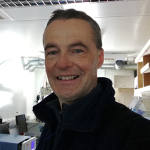 I'm an analytical chemist specialised in trace elemental analysis, and trace element speciation studies. My goals include determining the role, fate and toxic effects of heavy metals in the environment and their impact on humanity. Recently I have been concentrating on mercury, it's atmospheric concentrations and presence in snow, ice and ground water, with particular emphasis on deposition phenomena. I have participated in 2 Antarctic Expeditions to Concordia Station and am the Italian National Expert on the POPs and Mercury Expert Groups of AMAP, the Arctic Monitoring and Assessment Program as well as on the Arctic Contaminants Action Program (ACAP).
I'm an analytical chemist specialised in trace elemental analysis, and trace element speciation studies. My goals include determining the role, fate and toxic effects of heavy metals in the environment and their impact on humanity. Recently I have been concentrating on mercury, it's atmospheric concentrations and presence in snow, ice and ground water, with particular emphasis on deposition phenomena. I have participated in 2 Antarctic Expeditions to Concordia Station and am the Italian National Expert on the POPs and Mercury Expert Groups of AMAP, the Arctic Monitoring and Assessment Program as well as on the Arctic Contaminants Action Program (ACAP).
I have co-authored over 64 publications and I am a writer for the Atomic Spectrometry Updates Environmental Analysis review of the Royal Society of Chemistry. I obtained my degree in Environmental Chemistry from the University of East Anglia, followed by an M.Sc in Analytical Chemistry, I obtained my Ph.D from the University of Plymouth in 1996.
Scopus - Author ID: 7003572964 Research Gate: Warren Cairns
Becherini Francesca
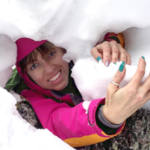 She took her degree in Physics at the University of Padua in 1999 and her PhD in Science for Conservation of Cultural Heritage at the University of Florence in 2007.
She took her degree in Physics at the University of Padua in 1999 and her PhD in Science for Conservation of Cultural Heritage at the University of Florence in 2007.
She joined the National Research Council of Italy in 2002 where she won a permanent position as a researcher in 2011. From 2002 to 2019 she worked at the Institute of Atmospheric Science and Climate (ISAC), Padua, then she moved to the Institute of Polar Sciences (ISP), Venice, where she is currently researcher.
Her research interests are in the fields of Atmospheric physics, Climatology and Microclimatology, Environmental Sciences.
At ISAC, she started working in microclimatology applied to the preventive conservation of cultural heritage assets, indoor environmental quality and energy saving, developing a large experience in multidisciplinary research projects. Then her research activity was more and more focused on climatology. Currently, her interest is on one side in climatic change research through the recovery, correction and analysis of proxy and instrumental series of climatic data; on the other in the study of atmospheric physical parameters and processes to investigate the energy balance and the polar climatic system. She was member of the coordination team of many FP5, FP7and H2020 European projects, and investigator in international and national projects. She was contract professor for masters and specialized course, tutor of PhD, BSc and MSc thesis.
Scopus - Author ID: 55370745600 ![]() http://orcid.org/0000-0002-8408-0102 WoS Researcher ID: AAD-8969-2020 Research Gate: Francesca Becherini
http://orcid.org/0000-0002-8408-0102 WoS Researcher ID: AAD-8969-2020 Research Gate: Francesca Becherini
SIOS PolarNightWeek 11-15 January 2021 - ONLINE
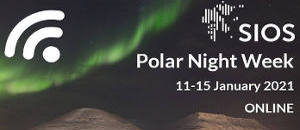 The third #PolarNightWeek for and with the #SIOS community will be held online, 11-15 January 2021.
The third #PolarNightWeek for and with the #SIOS community will be held online, 11-15 January 2021.
Arctic Frontiers 2021
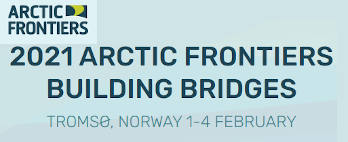 Arctic Frontiers Science 2021 will take place on 1-4 February 2021
Arctic Frontiers Science 2021 will take place on 1-4 February 2021
Arctic Frontiers 2021 goes digital!
Special Issue: Plastics in polar regions
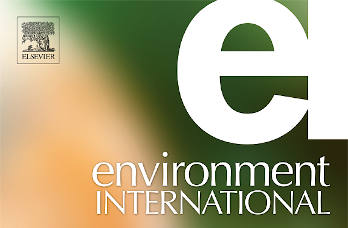 Pubblicato sul sito web della rivista internazionale Environment International lo Special Issue Plastics in polar regions.
Pubblicato sul sito web della rivista internazionale Environment International lo Special Issue Plastics in polar regions.
Guest Editor: Ilaria Corsi, Elisa Bergami, Gabriella Caruso (CNR-ISP), Simone Cappello
Special issue: Polar Marine Carbonates (deadline 21 August 2021)
 A special issue of Minerals (ISSN 2075-163X). This special issue belongs to the section Environmental Mineralogy and Biogeochemistry
A special issue of Minerals (ISSN 2075-163X). This special issue belongs to the section Environmental Mineralogy and Biogeochemistry
This Special Issue welcomes contributions on all compositional (chemical, physical, biological) aspects of polar and subpolar carbonates in the marine domain, recent and past.
Deadline for manuscript submissions: 21 August 2021
Special Issue Editors: Paolo Montagna (CNR-ISP) and Marco Taviani (CNR-ISMAR)
Artico - Microplastiche in un crostaceo
Sono state osservate microplastiche negli oceani, nelle acque dolci, nei suoli, nei sedimenti, nelle acque potabili, e anche nelle aree polari. Nel lavoro pubblicato su Environmental Research, i ricercatori dell’Enea, dell’Università La Sapienza e dell’Istituto di Scienze Polari (CNR-ISP) hanno osservato la presenza di microplastiche ingerite da Gammarus setosus (Amphipoda), un crostaceo diffuso nelle Isole Svalbard e in altre aree dell’Artico.
Le microplastiche ingerite dal G. setosus sono state studiate con tecniche specifiche di colorazione e tramite spettroscopia infrarossa (Micro-FTIR). Le particelle di plastica ritrovate all’interno degli organismi analizzati avevano dimensioni comprese tra i 3 e i 370 µm (milionesimi di metro).
Artico - Microplastiche in un crostaceo
27 Luglio 2020
L’inquinamento delle microplastiche è diffuso a livello globale tanto quanto lo è l’utilizzo delle materie plastiche. Le caratteristiche dei polimeri plastici che ne hanno decretato il successo (ad esempio la malleabilità, la durata, la resistenza alla corrosione, la versatilità nell’impiego, ecc.) sono le stesse che ne determinano la pericolosità a livello ambientale. Infatti, l’ubiquità e la persistenza delle materie plastiche rappresentano un pericolo per l’ambiente e per gli organismi. Si parla di plastic debris sin dagli anni ’70, ma il termine microplastiche entra nel lessico comune solo nel 2004, grazie al Professor Richard Thompson. Nel gennaio 2019 L’Agenzia Europea per le Sostanze Chimiche (European Chemical Agency, ECHA) ha dato una definizione precisa delle microplastiche e ne ha definito il range dimensionale. Le microplastiche possono essere particelle, ma anche fibre, poiché molti tessuti sintetici, come il nylon o il poliestere, sono dei polimeri plastici.
Artico - Ondata di calore alle Isole Svalbard
26 Luglio 2020
Le misure della Amundsen-Nobile Climate Change Tower (CCT) del CNR confermano l'ondata di calore che ha investito le Isole Svalbard e che ha avuto il suo picco nella giornata di sabato 25 luglio.
La temperatura misurata alla CCT ha superato i 18 °C, battendo il precedente record registrato dalla nostra torre pari a 16.9 °C, del 6 luglio 2019.
Curiosamente, questo è stato anche l'anno in cui abbiamo misurato la temperatura più bassa: -31.4 °C (11 marzo 2020).
(Mauro Mazzola CNR-ISP)
I dati in tempo reale dalla CCT
Alghe rosse sul ghiacciaio del Presena
Il fenomeno delle alghe rosse sulla neve è noto da tempo. Alghe nivali come la Chlamydomonas nivalis colorano di rosso la neve durante la primavera e l'estate sia alle medie latitudini che ai poli. Esiste relativamente poca letteratura scientifica riguardo questo fenomeno, il quale ha il diretto effetto di accelerare la fusione delle neve e del ghiaccio.
Quest'anno, la colorazione rossa è stata "avvistata" in varie zone delle Alpi Europee. In particolare, la neve al ghiacciaio del Presena (Trentino-AltoAdige) ha assunto una decisa colorazione rossa che ha destato l'attenzione degli escursionisti e degli operatori degli impianti di risalita. La presenza di queste alghe sulla neve provoca una diminuzione di albedo (o riflettività) della neve stessa, e induce un maggiore assorbimento di radiazione ed una fusione accelerata. (Continua .....)
Alghe rosse sul ghiacciaio del Presena
Il fenomeno delle alghe rosse sulla neve è noto da tempo. Alghe nivali come la Chlamydomonas nivalis colorano di rosso la neve durante la primavera e l'estate sia alle medie latitudini che ai poli. Esiste relativamente poca letteratura scientifica riguardo questo fenomeno, il quale ha il diretto effetto di accelerare la fusione delle neve e del ghiaccio.
Quest'anno, la colorazione rossa è stata "avvistata" in varie zone delle Alpi Europee. In particolare, la neve al ghiacciaio del Presena (Trentino-AltoAdige) ha assunto una decisa colorazione rossa che ha destato l'attenzione degli escursionisti e degli operatori degli impianti di risalita. La presenza di queste alghe sulla neve provoca una diminuzione di albedo (o riflettività) della neve stessa, e induce un maggiore assorbimento di radiazione ed una fusione accelerata. Il fenomeno è stato di recente studiato sia in Artico che in Antartide, e rappresenta una fonte di incertezza nei modelli di dinamica glaciale e nivale. In futuro, questo fenomeno potrebbe rivelarsi più intenso a causa dei cambiamenti climatici. Infatti, scarse precipitazioni nevose durante l’inverno e alte temperature priverili/estive creano il perfetto ambiente per lo sviluppo di queste alghe.
Fragranze e idrocarburi policiclici aromatici trovati sul monte Elbrus in Caucaso
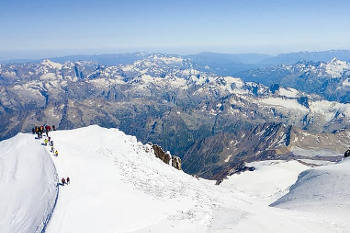 6 Luglio 2020
6 Luglio 2020
In un lavoro pubblicato su Scientific Reports, i ricercatori dell’Istituto di scienze polari del Consiglio nazionale delle ricerche (CNR-ISP) assieme ai colleghi dell’Università Ca’ Foscari Venezia, dello U.S. Geological Survey di Denver, dell’Università di Grenoble e dell’Istituto di geografia dell’Accademia russa di scienze hanno analizzato il contenuto di una carota prelevata sul ghiacciaio del monte Elbrus in Caucaso in idrocarburi policiclici aromatici (PAHs) - traccianti classici della contaminazione umana derivanti principalmente dalla combustione - e in fragranze utilizzate quotidianamente per la cura della persona - i cosiddetti inquinanti emergenti - ricavando i corrispondenti profili di concentrazione dagli anni ’30 del 1900 fino al 2005.
Comunicato stampa CNR
EOS - AGU : Fragrances in an Ice Core Tell a Story of Human Activity
Artico: Campagna High North 2020
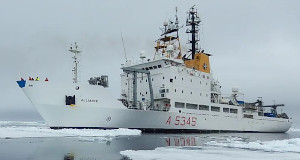 24 Giugno 2020
24 Giugno 2020
La Campagna oceanografica "High North" 2020 è organizzata dalla Marina Militare e dall'Istituto idrografico della marina con destinazione Artico. (22 Giugno - 28 Luglio 2020)
Il CNR concorre alla campagna tramite l'Istituto di Scienze Polari (ISP) e l'Istituto di Scienze Marine (ISMAR).
Comunicato stampa CNR sull'inizio della campagna
Comunicato della Marina Militare sulla chiusura della campagna
La nave Alliance (credits: Marina Militare)
Deep-Sea corals discovered in Australian submarine canyons facing the Southern Ocean
The waters offshore southwestern Australia, in particular the Bremer Marine Park, are already known as a biodiversity hotspot of marine species such as whales and dolphins, however, a recent expedition on board the R/V Falkor has now revealed rich and diverse ecosystems inhabiting the cold deep waters within the canyon. Led by researchers from the University of Western Australia (UWA) and the Institute of Polar Sciences (CNR-ISP) in Italy, these discoveries were only made possible by the philanthropic Schmidt Ocean Institute’s (SOI) deep-sea remotely operated vehicle, SuBastian, which is capable of sampling depths to 4,500 meters.
ClimRisk2020: Time for Action! - 21-23 October 2020
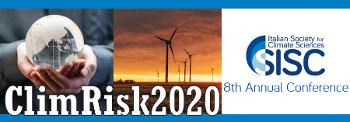 Conferenza annuale 2020
Conferenza annuale 2020
Il convegno, organizzato on-line, avrà una sessione specifica dedicata a:
Glaciers, ice sheets, sea–ice: climate of the past and future tipping points
SESS report 2020
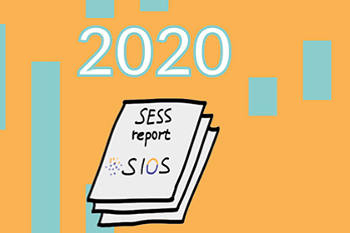 The call for contributions to the 2nd SESS report is open
The call for contributions to the 2nd SESS report is open
Deadline: 15 April 2020
SESS Report 2020 Web page
Training course on terrestrial remote sensing in Svalbard: now open also for non-members
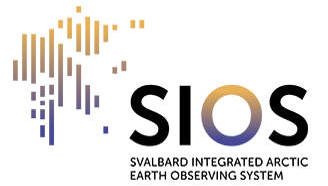 This autumn, SIOS will offer a training course on how to effectively use remote sensing data acquired from satellites, from the air or from the ground, and their associated tools and software in the context of terrestrial research in Svalbard. The course is intended for field scientists, Ph.D. students and technicians with no or little experience with remote sensing techniques. The training will be delivered by remote sensing experts from SIOS member institutions, international teachers and potential virtual talks from ESA experts.
This autumn, SIOS will offer a training course on how to effectively use remote sensing data acquired from satellites, from the air or from the ground, and their associated tools and software in the context of terrestrial research in Svalbard. The course is intended for field scientists, Ph.D. students and technicians with no or little experience with remote sensing techniques. The training will be delivered by remote sensing experts from SIOS member institutions, international teachers and potential virtual talks from ESA experts.
Application deadline: 7 June 2020
SIOS Web page
Ph.D in Science and Management of Climate Change
 The PhD programme in Science and Management of Climate Change is a joint initiative between Ca’ Foscari University of Venice and the Euro-Mediterranean Center on Climate Change (CMCC)
The PhD programme in Science and Management of Climate Change is a joint initiative between Ca’ Foscari University of Venice and the Euro-Mediterranean Center on Climate Change (CMCC)
The programme is taught entirely in English. Duration: 4 years
Details
Dottorato in Scienze e tecnologie ambientali, geologiche e polari
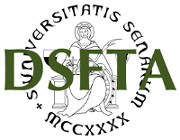 Il Dottorato ha sede presso le strutture del Dipartimento di Scienze Fisiche, della Terra e dell’Ambiente dell’Università degli Studi di Siena. Il Dottorato in Scienze e tecnologie ambientali, geologiche e polari ha una forte connotazione inter- e multidisciplinare (settori scientifico disciplinari delle aree CUN 03, 04, 05 e 07) e si propone di fornire una formazione post-laurea di alto livello nelle ricerche, sia di base che applicate, rivolte allo studio del funzionamento e delle interazioni tra i diversi comparti della Terra, le quali trovano una sintesi nella cosiddetta Earth System Science.
Il Dottorato ha sede presso le strutture del Dipartimento di Scienze Fisiche, della Terra e dell’Ambiente dell’Università degli Studi di Siena. Il Dottorato in Scienze e tecnologie ambientali, geologiche e polari ha una forte connotazione inter- e multidisciplinare (settori scientifico disciplinari delle aree CUN 03, 04, 05 e 07) e si propone di fornire una formazione post-laurea di alto livello nelle ricerche, sia di base che applicate, rivolte allo studio del funzionamento e delle interazioni tra i diversi comparti della Terra, le quali trovano una sintesi nella cosiddetta Earth System Science.
Pagina dettagli - Dottorato in Scienze e tecnologie ambientali, geologiche e polari
MASTER Universitario in Sviluppo Sostenibile, Geopolitica delle Risorse e Studi Artici
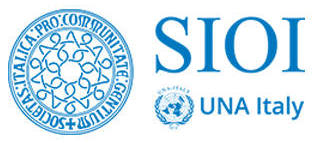 La Società Italiana per l'Organizzazione Internazionale (SIOI) e Unitelma Sapienza, d’intesa con il Ministero degli Affari Esteri e della Cooperazione Internazionale ed il CNR, organizzano il Master in Sviluppo Sostenibile, Geopolitica delle risorse e Studi Artici. L'obiettivo del Master è di sviluppare capacità e competenze nei settori della green economy, della geopolitica dell'energia e delle risorse con particolare attenzione all'eco-sostenibilità e all'utilizzo responsabile del territorio. Un focus approfondito sarà dedicato all'importanza geostrategica ed economica delle Regioni artiche.
La Società Italiana per l'Organizzazione Internazionale (SIOI) e Unitelma Sapienza, d’intesa con il Ministero degli Affari Esteri e della Cooperazione Internazionale ed il CNR, organizzano il Master in Sviluppo Sostenibile, Geopolitica delle risorse e Studi Artici. L'obiettivo del Master è di sviluppare capacità e competenze nei settori della green economy, della geopolitica dell'energia e delle risorse con particolare attenzione all'eco-sostenibilità e all'utilizzo responsabile del territorio. Un focus approfondito sarà dedicato all'importanza geostrategica ed economica delle Regioni artiche.
Ocean Space Nowtilus - L'Ecosistema lagunare
 L'Ecosistema lagunare con Luigi Cavaleri, oceanografo all’ISMAR-CNR, Fabiana Corami, biologa, Istituto di Scienze Polari del CNR (CNR-ISP); e Beatrice Rosso, ricercatrice, Dipartimento di Scienze Ambientali, Informatica e Statistica dell’Università Ca’ Foscari.
L'Ecosistema lagunare con Luigi Cavaleri, oceanografo all’ISMAR-CNR, Fabiana Corami, biologa, Istituto di Scienze Polari del CNR (CNR-ISP); e Beatrice Rosso, ricercatrice, Dipartimento di Scienze Ambientali, Informatica e Statistica dell’Università Ca’ Foscari.
Podcast disponibile a partire da venerdì 5 giugno, ore 16.00.
Agenda della manifestazione
WEBINAR on the European Polar Research Programme - 11 June 2020
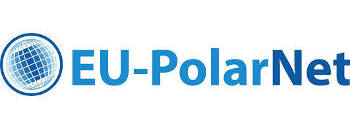 Conferences and workshops
Conferences and workshops
Webinar on the European Polar Research Programme
11th June 2020 - Time: 10:00 - 13:00 CEST
Place: online. Please register here
Osservazione, rimozione manuale e riconoscimento dello zooplancton catturato in colonna d’acqua mediante trappole di sedimento
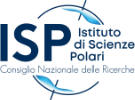 Dove: CNR-ISP Sede di Bologna
Dove: CNR-ISP Sede di Bologna
Tipologia: Tirocinio curricolare
Titolo: Osservazione, rimozione manuale e riconoscimento dello zooplancton catturato in colonna d’acqua mediante trappole di sedimento
Tutor/Docente di riferimento: Dr. Patrizia Giordano, tel. 051 6398902, e-mail: patrizia.giordano AT cnr.it
Tecniche di laboratorio per il trattamento e analisi di campioni di trappole di sedimento per la stima dei flussi verticali di materiale particellato e di sostanza organica nella colonna d’acqua
 Dove: CNR-ISP Sede di Bologna
Dove: CNR-ISP Sede di Bologna
Tipologia: Tirocinio curricolare
Titolo: Tecniche di laboratorio per il trattamento e analisi di campioni di trappole di sedimento per la stima dei flussi verticali di materiale particellato e di sostanza organica nella colonna d’acqua
Tutor/Docente di riferimento: Dr. Patrizia Giordano, tel. 051 6398902, e-mail: patrizia.giordano AT cnr.it
Long-term variability of zooplankton communities in an Artic fjord (Kongsfjorden, Svalbard) in relation of climate variability (2010-2020)
 Dove: CNR-ISP Sede di Bologna
Dove: CNR-ISP Sede di Bologna
Tipologia: Tesi di Laurea
Titolo: Long-term variability of zooplankton communities in an Artic fjord (Kongsfjorden, Svalbard) in relation of climate variability (2010-2020)
Tutor/Docente di riferimento: Dr. Patrizia Giordano, tel. 051 6398902, e-mail: patrizia.giordano AT cnr.it
Variabilità dei flussi di materiale particellato nel mare Adriatico Meridionale
 Dove: CNR-ISP Sede di Bologna
Dove: CNR-ISP Sede di Bologna
Tipologia: Tirocinio, Tesi di Laurea
Titolo: Variabilità dei flussi di materiale particellato nel mare Adriatico Meridionale
Tutor/Docente di riferimento: Dr. Stefano Miserocchi, tel. 051 639880, e-mail: stefano.miserocchi AT cnr.it
Stime del forcing radiativo delle nubi nel plateau antartico e in artico
 Dove: CNR-ISP Sede di Bologna
Dove: CNR-ISP Sede di Bologna
Tipologia: Tesi di Laurea
Titolo: Stime del forcing radiativo delle nubi nel plateau antartico e in artico
Tutor/Docente di riferimento: Dr. Angelo Lupi, tel. 051 6399588, email: angelo.lupi AT cnr.it
Impact of the COVID19 outbreak on Italian Polar activities
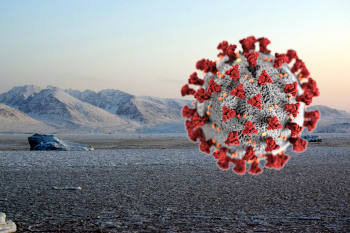
5 Maggio 2020
Arctic
Svalbard: Based on the national policy adopted in consequences of COVID19 pandemic and the restrictions imposed by Norwegian government and the Governor of Svalbard, CNR cancelled all the upcoming field activities at Dirigibile Italia Arctic station until the end of May. Assuming that these restrictions will continue, further cancellations are expected. At the moment, CNR has only one technician there managing the routine operations. Starting from June, some monitoring activities will be supported by the Norwegian Polar Institute staff. (read more)
Svalbard Strategic Grant (SSG)
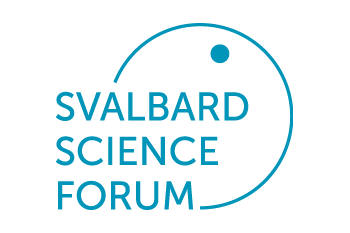 The Svalbard Strategic Grant is a seed money program aimed at advancing coordination, collaboration and data sharing between researchers with a relevance to Svalbard.
The Svalbard Strategic Grant is a seed money program aimed at advancing coordination, collaboration and data sharing between researchers with a relevance to Svalbard.
The program is financed by the Research Council of Norway (RCN) and administered by the Svalbard Science Forum (SSF) secretariat in Longyearbyen.
A call for proposals is made annually. The application deadline is the 16 December 2019.
The full call text is available here.
Distribuzione e caratterizzazione di small microplastics (inferiore a 100 um) nel permafrost: le Isole Svalbard come caso di studio
 Dove: CNR-ISP Sede Venezia-Mestre
Dove: CNR-ISP Sede Venezia-Mestre
Tipologia: Tirocinio, Tesi di Laurea
Titolo: Distribuzione e caratterizzazione di small microplastics (<100 µm) nel permafrost: le Isole Svalbard come caso di studio
Tutor/Docente di riferimento: Dr. Fabiana Corami, tel. 041 2348658, e-mail: fabiana.corami AT cnr.it
Special Issue: Advances in Water Quality Monitoring and Assessment in Marine and Coastal Regions (deadline 31 December 2021)

A special issue of Water (ISSN 2073-4441). This special issue belongs to the section "Oceans and Coastal Zones".
This Special Issue aims at the promotion of a multidisciplinary approach to evaluate the quality of aquatic ecosystems, with a particular focus on the transitional environments where marine and terrestrial habitats interlink. Research/review papers jointly dealing with coastal oceanography, hydrogeology, biogeochemistry and marine ecology are of interest, although studies on surface waters (rivers, lakes, etc.) in coastal regions are also welcomed.
Deadline for manuscript submissions: 31 March 2021
Special Issue Editors: Alessandro Bergamasco (CNR-ISMAR), Hong Quan Nguyen (WACC), Gabriella Caruso (CNR-ISP), Qianguo Xing (YIC), Eleonora Carol (CONICET)
Special Issue: Distribution and Metabolic Activities of Marine Microbial Communities in Response to Natural and Anthropogenic Forcings (deadline 30 June 2020)

A special issue of Journal of Marine Science and Engineering (ISSN 2077-1312). This special issue belongs to the section "Marine Biology".
Deadline for manuscript submissions: 30 June 2020
Special Issue Editor: Gabriella Caruso (CNR-ISP)
50esima Giornata Mondiale della Terra - EARTH DAY 2020 - Viaggio dal Polo Sud al Polo Nord della Terra
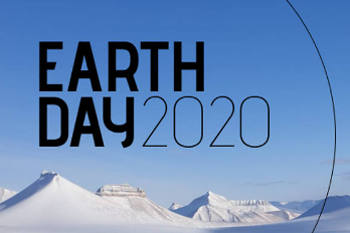 De Agostini Scuola, in collaborazione con il CNR, celebra la giornata internazionale della Terra con un viaggio dal Polo Sud al Polo Nord della Terra, alla scoperta della salute del nostro pianeta.
De Agostini Scuola, in collaborazione con il CNR, celebra la giornata internazionale della Terra con un viaggio dal Polo Sud al Polo Nord della Terra, alla scoperta della salute del nostro pianeta.
22 Aprile 2020, 11:00
Con: Luca Perri, Marco Casula (CNR-ISP), il team CNR in Antartide, Angelo Viola (CNR-ISP) e Serena Giacomin
VIDEO - Earth day 2020: Un viaggio sostenibile dal Polo Sud al Polo Nord
Destinatari:
Docenti e studenti della Scuola secondaria di I Grado e Primo biennio del II Grado
Special Issue: Polar Microbial Ecology: The Role of Microbes in the Functioning of Extremely Cold Ecosystems (deadline 31 July 2020)

A special issue of Microorganisms (ISSN 2076-2607). This special issue belongs to the section "Environmental Microbiology".
This Special Issue invites you to join in by submitting contributions concerning the role of microbes in the functioning of extremely cold ecosystems, by including as main topics correlations between microbial diversity and polar environmental conditions, temporal and spatial changes in polar microbial communities, metagenomics and molecular advances in polar microbial ecology, relationships and symbiotic associations of cold-adapted microbes with their implications, biogeochemical processes in polar habitats, polar bioprospecting, role of polar microbes in restoration of environments, and biotechnological applications of these extremophiles.
Deadline for manuscript submissions: 31 July 2020
Special Issue Editors: Angelina Lo Giudice (CNR-ISP), Carmen Rizzo (UNI-Me), Maurizio Azzaro (CNR-ISP)
Rientrato in Italia Marco Casula (CNR-ISP)
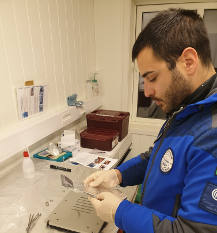 10 Giugno 2020
10 Giugno 2020
Marco Casula, tecnico del CNR-ISP, è rientrato in Italia dalla Stazione di Ricerca in Artico del CNR Dirigibile Italia a Ny-Ålesund, nelle Isole Svalbard.
Il tecnico si trovava presso la Stazione del Cnr dal primo gennaio 2020 con il ruolo di acting station leader ed era rimasto bloccato, causa COVID-19.
ALTRO:
- Intervista dal sito ufficiale del CNR (5 aprile 2020)
- Articolo sul sito "Altre Storie"
- Puntata di GEO AND GEO del 7 aprile 2020
ANTARCTICA 2020 - St. Petersburg, RUSSIA
Due to the unpredictable situation with COVID-19, the conference will be postponed until late spring 2021.
An international conference on polar science and exploration organized by the Arctic and Antarctic Research Institute (AARI) and Roshydromet.
They invite specialists in the following fields to participate in the conference:
- Antarctic geology and solid Earth geophysics
- Geomorphology and paleogeography
- Antarctic atmosphere and Southern Ocean
- Space weather
- Antarctic ice sheet dynamics and mass balance
- Subglacial environments
- Ice drilling and ice core science
- Biodiversity, microbiology and ecology
- Antarctic history and heritage.
#ANTARCTICA2020 Site
Special Issue: Geochemical Characterization of Geothermal Systems: Multidisciplinary Approaches to Define Source Processes, Evolution and Environmental Issues (deadline 15 December 2020)

A special issue of Geosciences (ISSN 2076-3263). This special issue belongs to the section "Geochemistry".
The main scope of this Special Issue is the exploration and evaluation of both innovative and long-validated approaches to the geochemical characterization of geothermal areas.
Deadline for manuscript submissions: 25 July 2022
Special Issue Editors: Giovanni Vespasiano (UNI-Cal), Massimiliano Vardè (CNR-ISP), Carmine Apollaro (UNI-Cal)
Azzaro Maurizio
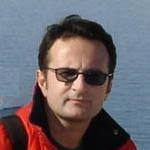 He has obtained two degrees (Biological Sciences; Natural Sciences) and a PhD in Marine Sciences and Engineering.
He has obtained two degrees (Biological Sciences; Natural Sciences) and a PhD in Marine Sciences and Engineering.
His research activities are mainly focused on the study of the functioning of polar ecosystems with an interdisciplinary approach dedicated to various topics ranging from microbial ecology and the study of the microbial food web, to the study of biodiversity and the functioning of marine and terrestrial ecosystems.
During his career he has addressed issues related to the development of new technologies in polar areas (areas marginal to marine glaciers), the effects of pollution (heavy metals, oil, plastics, etc.) and global changes on marine and terrestrial microbial communities. Attention was also paid to the conservation and protection of terrestrial and marine ecosystems with particular reference to the Antarctic Treaty Consultative Meeting (ATCM) and the Commission for the Conservation of Antarctic Marine Living Resources (CCAMLR).
He in thirty years of research has carried out a fervent field activity in a wide spectrum of marine and terrestrial environments: permafrost, sea ice, lakes (temperate and frozen), fjords, transitional areas, coastal areas, pelagic areas (Epi-, meso- and bati-pelago), marginal seas and polar areas. Overall, it has participated in national and international research projects (> 50), in over 60 scientific expeditions in Arctic, Antarctica (in 3 scientific coordinator of the expedition), China, Pacific Ocean, Atlantic Ocean and in the Mediterranean Sea (in 7 as Head of Mission).
During his career he has published more than 100 publications in national and international journals. Since 2019 he is responsible for the section of the Institute of Polar Sciences of Messina.
Scopus - Author ID: 6602752439
Azzaro Filippo
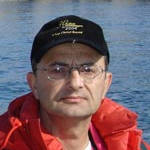 His scientific activity has been devoted to the control of chemico-physical and biological parameters of sea-water, with particular regard to the nutrient evaluation, both by traditional techniques and by means of instruments on line analysis (mobile station, oceanographic buoy) and to the evaluation of trophic parameters (chlorophyll a, ATP).
His scientific activity has been devoted to the control of chemico-physical and biological parameters of sea-water, with particular regard to the nutrient evaluation, both by traditional techniques and by means of instruments on line analysis (mobile station, oceanographic buoy) and to the evaluation of trophic parameters (chlorophyll a, ATP).
From 1990 he is responsible of the laboratory of chemical oceanography. He participated in several oceanographic cruises of national and international programs. Mission chief of several oceanographic cruises in the Mediterranean Sea. From 1989 has participated national program for the research in Antarctica.
He participated in the following Italian scientific expeditions to Antarctica: X Italian-Belgian-U.S. within ROSSMIZE (1994/95), XIX VLT (2003/04), XX ABIOCLEAR (2004/05), XXXI CEFA (2015-2016) e XXXII P.ROSE e CELEBER (2016-2017) programme. He produced about 100 scientific publications.
Scopus - Author ID: 8516485200
Caruso Gabriella
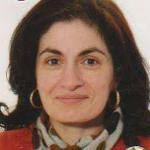 Graduated in Biological Sciences, Specialist in Applied Microbiology, she has been a CNR researcher since 1994.
Graduated in Biological Sciences, Specialist in Applied Microbiology, she has been a CNR researcher since 1994.
Her scientific interests focus on marine microbial ecology and the role of microorganisms in the decomposition processes of organic matter in Mediterranean and polar environments through enzymatic activity measures (aminopeptidase, glucosidase, phosphatase); the search for pathogenic bacteria (Escherichia coli, Vibrio spp.) by means of fluorescent antibody method and enzymatic assays; changes in physiological parameters (digestive enzymes, non-specific immunity) of marine Teleosts in response to stressors. Recent studies in extreme environments have explored the abundance and activity of the free-living heterotrophic bacterial community (UVASS, Svalbard, Arctic Project), present in permafrost or brines (National Antarctic Research Program projects-PNRA 2013/AZ1.05), of microbial biofilms over plastic substrates (PNRA16_00105), acting also as vectors of antibiotic resistance (PNRA 14_00090).
Member of the PhD School for Applied Hygiene - Univ. Messina (2006-2011) and of the Plankton (2000-2001; 2002-2003; 2010-2012; 2013-2015) and Aquaculture Committees (2004-2006; 2016-2018; 2019-2021) of the Italian Society of Marine Biology. Qualified as Full Professor of Ecology (2012-2020). P.I. and member of several research projects (PNRA, EU FP 7 PERSEUS, Marine Strategy, VECTOR, MIUR Cluster-Advanced Monitoring Systems), she has collaborated with the Institute of Hydrobiology-Wuhan (China), Univ. du Sud Toulon-France, CENPAT- Puerto Madryn (Argentina), CERTE-Soliman (Tunisia).
Co-author of over 350 scientific papers, she has a H index 19 (Scopus). Refeee (Publons) and member of Editorial Boards of OA international journals (J. Mar. Sci. Engin.-JMSE, MDPI; J. Coastal Life Medicine, Hainan Univ.; J. Clinical Microbiol. Biochem. Technol.- PEERTECHZ; The Open Fish Sci. J., The Open Mar. Biol. J., BENTHAM; J. Oceanogr. Mar. Res., LONGDOM; J. Ecosyst. Ecogr. OMICS).
Scopus - Author ID: 7102219836 ![]() http://orcid.org/0000-0002-3819-5486 Scholar
http://orcid.org/0000-0002-3819-5486 Scholar
Decembrini Franco
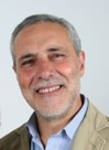 Degree in Biological Sciences (1983), and Ph.D. in Environmental sciences: Marine environment and resources (1989), and CNR researcher in marine ecology (1994).
Degree in Biological Sciences (1983), and Ph.D. in Environmental sciences: Marine environment and resources (1989), and CNR researcher in marine ecology (1994).
The scientific work is summarized in several Technical Reports of oceanographic cruises (as scientific head) and more than 100 publications on national and international journals in the following lines of research:
(i) ecological and physiological role of phytoplankton size-fraction in marine food webs of coastal and off-shore zone in the Mediterranean Sea, Ross Sea (Antarctica) and the Straits of Magellan;
(ii) study of the trophic conditions in the brackish lagoon ecosystems exposed to chemical pollution and eutrophication phenomena (Habs);
(iii) development of automatic monitoring of physico-chemical, optics and biological parameters (phytoplankton) in coastal marine environments through in situ (buoy and ship) and remote sensing (MIVIS, SeaWiFS).
He has participated in several national programs (ROSSMIZE, PRISMA, CLUSTER10, SNOW Artide) and projects of CNR and the Mi.P.A. and international (EU VFP: Strategy; EU FP6: SPICOSA WT 10.3 leader ; INTERACT EU: Sponge).
Scopus - Author ID: 6603331973
Zaccone Renata
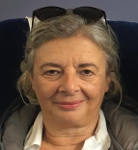 She is Graduated in Biological Sciences and specialized in Applied Microbiology.
She is Graduated in Biological Sciences and specialized in Applied Microbiology.
Since 1982 she has carried out research activity at the CNR, Istituto Sperimentale Talassografico of Messina, now part of the ISP-CNR. Since 2001 she is Senior Researcher.
From the beginning she has been involved in research in the field of microbial ecology. She studies the interactions among environmental factors and marine microbial communities; in particular the effects of climate change on biogeochemical cycles, through the study of the decomposition rates of organic matter (measurements of enzymatic activity such as peptidases, glucosidases and phosphatases).
Other research interests are: -testing the antimicrobial activity of essential oils and new polymers; -evaluation of the health risk in coastal waters (by experimentation of the immunofluorescence technique for the direct count of Escherichia coli, Vibrio spp, Photobacterium). P.I. of National (PRISMA 1, Marine Ecosystems/SINAPSI; MIPAF IV triennial plan N.C16; PON-RSF 2000-2006 N.12745; VECTOR L.4–5.2) and regional projects. Author of over 130 scientific papers published in international and national journals.
Recently she has collaborated on PNRA projects: 2014-2015 PNRA Project: Coastal Ecosystem Functioning in a changing Antarctic ocean (CEFA). P.I. Prof. L. Guglielmo, UO 7, dr. R. La Ferla.
2016-2017 PNRA16 proposal: Biodiversity and functioning of the planktonic ecosystems of the Ross Sea in the changing Southern Ocean (P-ROSE), P.I. dr. O. Mangoni, UO 7, dr. R. La Ferla Microbial biogeochemical rates.
2016-2017 PNRA16: 00207 - A3 - CELEBeR (CDW Effects on glaciaL mElting and on Bulk of Fe in the Western Ross sea (CELEBeR). P.I. dr. P. Rivaro, U.O. dr. Maurizio Azzaro.
2020-2021 PNRA18-0041-B2, Screening of antibiotic-resistance phenomena in bacterial strains isolated from water, sediment and intestine of Antarctic teleosts. P.I. Dr. M. Mancuso.
Scopus - Author ID: 6701823549 ![]() http://orcid.org/0000-0002-0151-9416
http://orcid.org/0000-0002-0151-9416
Filiciotto Francesco
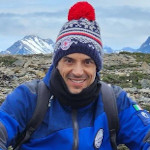 He participated as scientific coordinator and/or collaborator in the following Research Projects: SOS-BASS-PRIN; ELENO-PONANT within ARICE; VECNA; MARE-ERASMUS+ PLNRDA 2017-2019; MSFD, Dir. 2008/56/EC; SySTeMiC-University of the South Pacific; BYCATCH VII-MIPAAF; CAIMAR JOINT LABORATORY; IRSES-RECOMPRA; Environmental monitoring CNR-AMP Isole Pelagie; “EMSO-MedIT”; BIOforIU; REMOTO-PO FESR; PESCATEC- PON; RITMARE-MIUR; TESEO-PON; CALYPSO- Italy-Malta; ICT for the Excellence of the Territories; STROAM- Italy-Russia. He participated in numerous national and international scientific expeditions at sea as mission leader and/or member of the scientific staff. Member of scientific expeditions in the Arctic for the collection of acoustic data and at the geographic North Pole. Responsible for the Laboratory of Acoustic Biodiversity and Marine Ecology (BioSoundEcology Lab) at CNR-ISP, Messina; Responsible for Agreements between CNR and Universities; he carried out teaching activities at the Faculty of Veterinary Medicine of Messina; evaluator of project proposals ARTA, MIUR, PO FEP, POR FESR; he took part as president and/or member in about 50 competition commissions for different positions in the research profiles; he participated as a speaker in more than 30 National/International Conferences; he held the position of Responsible for personnel with Research Grant, Scholarship, Thesis and Internship pre- and post-graduate. He is co-author of more than 40 international publications on ISI scientific journals and more than 80 publications among national scientific journals, proceedings, books, project reports, technical reports and patents filed.
He participated as scientific coordinator and/or collaborator in the following Research Projects: SOS-BASS-PRIN; ELENO-PONANT within ARICE; VECNA; MARE-ERASMUS+ PLNRDA 2017-2019; MSFD, Dir. 2008/56/EC; SySTeMiC-University of the South Pacific; BYCATCH VII-MIPAAF; CAIMAR JOINT LABORATORY; IRSES-RECOMPRA; Environmental monitoring CNR-AMP Isole Pelagie; “EMSO-MedIT”; BIOforIU; REMOTO-PO FESR; PESCATEC- PON; RITMARE-MIUR; TESEO-PON; CALYPSO- Italy-Malta; ICT for the Excellence of the Territories; STROAM- Italy-Russia. He participated in numerous national and international scientific expeditions at sea as mission leader and/or member of the scientific staff. Member of scientific expeditions in the Arctic for the collection of acoustic data and at the geographic North Pole. Responsible for the Laboratory of Acoustic Biodiversity and Marine Ecology (BioSoundEcology Lab) at CNR-ISP, Messina; Responsible for Agreements between CNR and Universities; he carried out teaching activities at the Faculty of Veterinary Medicine of Messina; evaluator of project proposals ARTA, MIUR, PO FEP, POR FESR; he took part as president and/or member in about 50 competition commissions for different positions in the research profiles; he participated as a speaker in more than 30 National/International Conferences; he held the position of Responsible for personnel with Research Grant, Scholarship, Thesis and Internship pre- and post-graduate. He is co-author of more than 40 international publications on ISI scientific journals and more than 80 publications among national scientific journals, proceedings, books, project reports, technical reports and patents filed.
Scopus - Author ID: 36058746700 ![]() http://orcid.org/0000-0002-9418-0414
http://orcid.org/0000-0002-9418-0414
Lo Giudice Angelina
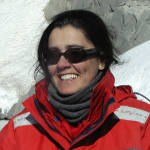 She got her Ph.D. in Environmental Sciences at the University of Messina in 2006. Actually, she is member of the Committee for the Collection and Management of Antarctic samples of the PNRA-MIUR, and of the Executive Committee of the CUR for the study of Extreme Environments and Extremophiles Francesco Maria Faranda (University of Messina).
She got her Ph.D. in Environmental Sciences at the University of Messina in 2006. Actually, she is member of the Committee for the Collection and Management of Antarctic samples of the PNRA-MIUR, and of the Executive Committee of the CUR for the study of Extreme Environments and Extremophiles Francesco Maria Faranda (University of Messina).
She collaborated with the University of Messina for the scientific management of the Italian Collection of Antarctic Bacteria of the National Antarctic Museum (CIBAN-MNA).
She participated to sampling campaigns in Antarctic and Arctic areas, as well as to oceanographic cruises in the Mediterranean. She is actively involved in national and international research projects in the fields of microbial ecology (diversity and function of prokaryotes) of polar environments, biotechnology of cold-adapted bacteria (e.g.,. search for xenobiotic degraders and biomolecule producers) and bacterial interactions. She is particularly interested in the bacterial association with benthic filter-feeders, and in the relationships between prokaryotes and chemical contamination.
She is author or co-author of more than 70 papers in international peer-reviewed journals, among which Physics of Life Reviews, Scientific Reports, Biotechnology Advances, Science of the Total Environment, Soil Biology and Biochemistry, PLOS One, Applied and Environmental Microbiology, Microbial Ecology, and several book chapters. She is peer-reviewer for international journals on ecology and microbiology, and scientific reviewer for project proposals for international polar agencies. She is member of the open-access journals Microorganisms (Section Microbial Biotechnology) and Diversity (Section Microbial Diversity), and Review Editor for “Frontiers in Marine Sciences: Marine Biotechnology”.
Scopus - Author ID: 57202031230 ![]() http://orcid.org/0000-0002-8842-083X Research Gate: Angelina Lo Giudice
http://orcid.org/0000-0002-8842-083X Research Gate: Angelina Lo Giudice
Rappazzo Alessandro Ciro
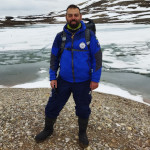 He is currently a fixed-term Technical Collaborator (VI level) (from July 2023) within the PNRR EMBRC project Unlocking the Potential for Health and Food from the seas - EMBRC-UP. Since 2021 he has also been a PhD student in Polar Sciences at the Ca' Foscari University of Venice. In 2014 he obtained a degree in Biology and Ecology of the Coastal Marine Environment at the University of Messina, with the thesis entitled Tolerance to heavy metals and polychlorinated biphenyls in Arctic bacteria (Continental Norway). During the preparation of his degree thesis he spent 4 months at the University of Valencia (Spain) to acquire new laboratory techniques. He has participated in several sampling activities in the Arctic, Antarctica and the Mediterranean for the collection and processing of samples for microbiological studies. In particular, the research interest is aimed at the study of microbial populations in aquatic environments (sea, freshwater and hyperhaline brine), sediments and permafrost. Among the techniques used: estimation of prokaryotic biomass by counting and morphometric and morphological analysis, through the application of microscopic techniques in epifluorescence and image analysis; analysis of the prokaryotic community using CARD-FISH and next generation sequencing; estimation of physiological profiles of prokaryotes at community level using BIOLOG Ecoplate; quantification of viable cells through the use of biomarkers (LIVE/DEAD and CTC); screening of bacteria for the ability to degrade polluting organic compounds. He is the author or co-author of approximately 25 articles in international journals.
He is currently a fixed-term Technical Collaborator (VI level) (from July 2023) within the PNRR EMBRC project Unlocking the Potential for Health and Food from the seas - EMBRC-UP. Since 2021 he has also been a PhD student in Polar Sciences at the Ca' Foscari University of Venice. In 2014 he obtained a degree in Biology and Ecology of the Coastal Marine Environment at the University of Messina, with the thesis entitled Tolerance to heavy metals and polychlorinated biphenyls in Arctic bacteria (Continental Norway). During the preparation of his degree thesis he spent 4 months at the University of Valencia (Spain) to acquire new laboratory techniques. He has participated in several sampling activities in the Arctic, Antarctica and the Mediterranean for the collection and processing of samples for microbiological studies. In particular, the research interest is aimed at the study of microbial populations in aquatic environments (sea, freshwater and hyperhaline brine), sediments and permafrost. Among the techniques used: estimation of prokaryotic biomass by counting and morphometric and morphological analysis, through the application of microscopic techniques in epifluorescence and image analysis; analysis of the prokaryotic community using CARD-FISH and next generation sequencing; estimation of physiological profiles of prokaryotes at community level using BIOLOG Ecoplate; quantification of viable cells through the use of biomarkers (LIVE/DEAD and CTC); screening of bacteria for the ability to degrade polluting organic compounds. He is the author or co-author of approximately 25 articles in international journals.
Papale Maria
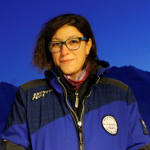 Born in Messina, she obtained her Ph.D. in Environmental Sciences at the University of Messina (2016) presenting the thesis PCB-oxidising bacteria from Arctic and Antarctic environments. She is a member of the eLTER H2020 Starting Communities project group and of the Association of Polar Early Career scientists APECS group.
Born in Messina, she obtained her Ph.D. in Environmental Sciences at the University of Messina (2016) presenting the thesis PCB-oxidising bacteria from Arctic and Antarctic environments. She is a member of the eLTER H2020 Starting Communities project group and of the Association of Polar Early Career scientists APECS group.
Currently, she is coordinating the PNRA18_00194 Microbial response to human Pollutants in polAr lakeS-MicroPolArS project and the INTERACT Mercury concentration and tolerant microorganisms in Arctic SNOW: new Bioremediation chALLenges – SNOW BALL project. She actively participates in national and international research projects on topics related to microbial ecology and biotechnology in polar environments. Particular interest is directed to the use of molecular tools for the study of biodiversity and the functionality of microbial communities, with attention to the ability to degrade polluting compounds. As part of projects focused on microbiology in polar environments, she has participated in sampling campaigns in the Arctic and Antarctica, as well as oceanographic cruises in the Mediterranean.
She specializes in: the treatment of microbiological samples of various origins; the use of molecular tools for bacterial biodiversity and DNA/RNA probe hybridization; analysis of microbial communities (metagenomics) by next-generation sequencing; differential expression and statistical validation of RNA-seq data; estimation of microbial biomass; screening of bacteria for the production of molecules of biotechnological interest and for the ability to degrade polluting compounds. She has had the opportunity to perfect her bioinformatics and laboratory skills also thanks to numerous stays in foreign institutes including Sequentia biotech (Barcelona, Spain), the University of Jyvaskyla (Finland), and the University of Valencia (Spain). She is the author or co-author of numerous articles in peer-reviewed journals, including Scientific Reports, Science of the Total Environment, Soil Biology and Biochemistry, PLOS One, Applied and Environmental Microbiology, Microbial Ecology, and more than 30 communications at national and international conferences.
![]() http://orcid.org/0000-0002-6013-4436 Research Gate
http://orcid.org/0000-0002-6013-4436 Research Gate
Cosenza Alessandro
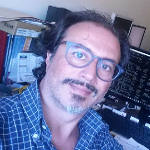 CTER IV livello – IT Manager
CTER IV livello – IT Manager
System administrator of the CNR-ISP Messina detached branch. In this context, it carries out the following activities:
- Access Port Manager (APM) - technical reference to the GARR;
- maintains the network infrastructure of the Messina institute;
- maintains network services and, in particular, the servers (e.g. file server, web server, firewall, DNS, NAT, etc…) for the delivery of transversal and local services;
- management of transmission networks (LAN and wireless);
- management of routing polices (router CISCO and firewall);
- hardware and software assistance and support to workstations in offices and laboratories;
- support for videoconferencing;
- use of statistical software for processing and interpretation of experimental results (in particular through the use of R, a specific development environment for statistical analysis of data).
He also manages the local staff institute data: attendance, absence, skills, meal vouchers, through ePAS, the system for detecting and managing attendance of CNR staff.
Maimone Giovanna
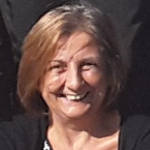 She is currently CTER - IV level at the Institute of Polar Sciences in Messina.
She is currently CTER - IV level at the Institute of Polar Sciences in Messina.
She has participated to numerous oceanographic cruises in the Mediterranean Sea with particular regard to the collection, treatment and analysis of samples. She actively participates at national and international research projects on polar issues.
Her research activities are mainly devoted to the study of the ecology of bacterial populations in aquatic samples (seawater and brines) and permafrost. In particular: to the study of the biomass of prokaryotes by counting and morphometric and morphological analyses, through the application of microscopic techniques in epifluoresence and image analysis; the estimation of physiological profiles at community level of prokaryotes through BIOLOG Ecoplate; the quantification of viable cells through the use of biomarkers (LIVE/DEAD and CTC). She also performs graphic and statistical processing of experimental data and collaborates in the drafting of scientific papers.
Scopus - Author ID: 7801432695
Montagna Paolo
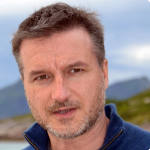 Director of Research at CNR-ISP.
Director of Research at CNR-ISP.
Laurea (M. Sc. equiv.) in Geology (1999), University of Padova. PhD (European Doctorate Label) in Earth Sciences (2005), University of Padova, in collaboration with the Australian National University.
His research mainly focuses on the development and application of geochemical proxies for paleoclimate reconstructions on a variety of timescale and aims to address some of the fundamental aspects of the biomineralization mechanisms in calcifying organisms (corals, molluscs, calcareous algae). This includes the analysis of minor and trace elements, as well as stable (11B/10B) and radiogenic (143Nd/144Nd, 87Sr/86Sr, 230Th/U) isotopes in biogenic carbonates.
He has acquired significant expertise in the geochemistry of biogenic carbonates, physical and chemical oceanography and deep-sea habitat mapping while working for extended periods at world leading institutions for geochemistry and paleoclimate related studies (Australian Institute of Marine Sciences, Australian National University, Lamont-Doherty Earth Observatory, Laboratoire des Sciences du Climat et de l'Environnement, Université Paris-Saclay and University of Western Australia). He has participated to 20 oceanographic cruises in the Mediterranean Sea, Atlantic, Indian Ocean, and the Ross Sea off Antarctica (some of them as chief or co-chief scientist), and several SCUBA diving expeditions in the Caribbean Sea, Red Sea, Indian and Pacific Ocean.
He has authored more than 90 peer-reviewed scientific papers, 4 book chapters, more than 120 abstracts and 20 invited talks, and he has served as a proposal reviewer for ERC Advanced Grant, NSF-USA, ANR-France, CNRS/INSU-France, NSERC-Canada, FONDECYT-Chile, DFG-Germany, ISF-Israel, Czech Science Foundation, EUROFLEET Plus, Swiss National Science Foundation Eccellenza Professional Fellowship, SCOR WG and Italian Programme for recruitment of young researcher as well as for 25 peer-reviewed scientific journals.
![]() http://orcid.org/0000-0001-5598-2214 Google Scholar
http://orcid.org/0000-0001-5598-2214 Google Scholar
Miserocchi Stefano
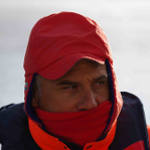 Degree in Geological Sciences in 1987 in Bologna. Researcher at the CNR Institute of Marine Sciences from 1994 to 2019, he has been involved in biogeochemical and sedimentological research in the marine and coastal environment.
Degree in Geological Sciences in 1987 in Bologna. Researcher at the CNR Institute of Marine Sciences from 1994 to 2019, he has been involved in biogeochemical and sedimentological research in the marine and coastal environment.
Sedimentology, biogeochemistry and dynamics of marine sediments and particles. Main focus on flux and mass balance calculations for carbon, as well as biogenic and terrigenous constituents to understand origins, transport pathways and fates of particles on continental margins. Study of organic matter in the sediment and of nutrient fluxes at the water-sediment interface. His research interests currently are: (a) vertical fluxes of particles and lateral transportation of materials from the continental shelf to deep basins in Arctic and Mediterranean Sea; (b) Non-destructive core logging/scanning methods including XRF Core Scanning.
Participation at EC and Arctic projects (Snow, Arca, Defrost). PI or WP leader of projects funded by ONR and national projects. Participation in more than 75 oceanographic cruises between 1990 and 2019 (on which 20 as Chief Scientist) for a total of 525 days of shipboard experience.
Author and co-author on over 158 publications (+ 120 abstracts) included data and technical reports, of which 62 publications on Scopus, 1513 citations, H index = 23.
Scopus - Author ID: 6602827994 Google Scholar
Mazzola Mauro
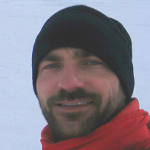 He mainly deals with two research topics: the physical and optical characterization of atmospheric particulate matter, also known as aerosol, and the estimate of the energy balance at the surface. As for the first topic, he uses techniques such as solar and lunar photometry for the estimation of the optical thickness of the aerosols in the atmosphere, the in-situ measurement of the scattering and absorption coefficients and the size distribution, through online optical. This last type of measurement is also carried out on profiles obtained by means of a tethered balloon. As for the energy balance, he uses an integrated approach between measurements and calculation codes for the radiative part, while the heat and mass balances are estimated by direct eddy covariance measurements. These activities take place mainly at the CNR infrastructures in Ny-Ålesund (Svalbard) and at the Korean base Jang Bogo in Antarctica, a country in which a close collaboration has been active for years.
He mainly deals with two research topics: the physical and optical characterization of atmospheric particulate matter, also known as aerosol, and the estimate of the energy balance at the surface. As for the first topic, he uses techniques such as solar and lunar photometry for the estimation of the optical thickness of the aerosols in the atmosphere, the in-situ measurement of the scattering and absorption coefficients and the size distribution, through online optical. This last type of measurement is also carried out on profiles obtained by means of a tethered balloon. As for the energy balance, he uses an integrated approach between measurements and calculation codes for the radiative part, while the heat and mass balances are estimated by direct eddy covariance measurements. These activities take place mainly at the CNR infrastructures in Ny-Ålesund (Svalbard) and at the Korean base Jang Bogo in Antarctica, a country in which a close collaboration has been active for years.
He is author of about 100 publications including journal articles and contributions in scientific books.
Scopus - Author ID: 24367405100
![]() http://orcid.org/0000-0002-8394-2292
Google Scholar
http://orcid.org/0000-0002-8394-2292
Google Scholar
Lupi Angelo
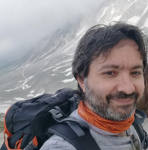 His main activities are focused in the study of the optical properties of the atmosphere, the interactions between ultraviolet radiation, visible and infrared with atmospheric constituents; his research interests have turned to the impact that aerosols, trace gases and clouds exert on the radiation balance of the Earth-atmosphere system, focusing in particular on the assessment of the direct radiative effects produced by the aerosol, on the assessment of the radiation balance in the polar areas and the role that gas trace, aerosols and clouds in these regions have particularly sensitive.
His main activities are focused in the study of the optical properties of the atmosphere, the interactions between ultraviolet radiation, visible and infrared with atmospheric constituents; his research interests have turned to the impact that aerosols, trace gases and clouds exert on the radiation balance of the Earth-atmosphere system, focusing in particular on the assessment of the direct radiative effects produced by the aerosol, on the assessment of the radiation balance in the polar areas and the role that gas trace, aerosols and clouds in these regions have particularly sensitive.
The scientific activity has been divided among the experimental research (mainly solar photometry, measurements of downwelling and upwelling radiative fluxes in the visible and near-and far-infrared, aerosol optical and physical properties), and modelling using radiative transport codes for the evaluation of the radiative fluxes in the atmosphere. Over the past years he has participated at multiple Antarctic polar campaigns, gaining experience in instrumentation and data analysis. He is co-author of more than 50 articles in international journals.
Scopus - Author ID: 7005284903 ![]() http://orcid.org/0000-0002-5009-9876
http://orcid.org/0000-0002-5009-9876
Langone Leonardo
 He is interested in determining rates of aquatic processes involving sediment particles, using radioactive tracers and time-series sediment traps. Particle dynamics is then applied to the study of the effects of climate change on the marine and polar environment, such as: a) biogeochemical cycles of organic C and biogenic silica in the Southern Ocean, Fram Strait and Mediterranean Sea; b) Late Quaternary paleoceanographic reconstructions using biogenic and radionuclide components; c) estimates of atmospheric CO2 growth rate in remote and polar ocean; c) particle transport by dense water cascading down to the deep marine realm; e) historical reconstruction of the sediment pollution of lacustrine and coastal environments in highly populated and remote polar areas.
He is interested in determining rates of aquatic processes involving sediment particles, using radioactive tracers and time-series sediment traps. Particle dynamics is then applied to the study of the effects of climate change on the marine and polar environment, such as: a) biogeochemical cycles of organic C and biogenic silica in the Southern Ocean, Fram Strait and Mediterranean Sea; b) Late Quaternary paleoceanographic reconstructions using biogenic and radionuclide components; c) estimates of atmospheric CO2 growth rate in remote and polar ocean; c) particle transport by dense water cascading down to the deep marine realm; e) historical reconstruction of the sediment pollution of lacustrine and coastal environments in highly populated and remote polar areas.
Participation at EC and national projects. PI of projects funded by industry and ONR. PI or WP leader in Antarctica and Arctic projects. CNR scientific contact in EU-ARICE and EU-INTERACT III. Experience >30 years of oceanographic campaigns with 90 participations (18 as Chief Scientist) in the Mediterranean, Atlantic, Southern Ocean and Arctic ocean. Scientific coordinator of marine activities during 2 Italian expeditions in Antarctica. He is the pro-tempore Director of the Institute of Polar Sciences of the Italian CNR (CNR-ISP).
He is author or co-author of ca. 100 scientific papers published on ISI journals with Impact Factor, ca. 60 scientific papers published on no-ISI journals, 7 chapters of book, 30 technical reports and cruise reports. Citation number amounts to about 2500, with a Hirsch factor (h-factor) of 27 (font Scopus).
Scopus - Author ID: 6603776561 Research Gate Google Scholar
La Mesa Mario
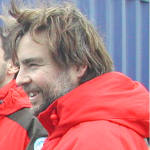 Laurea cum Laude in Biology (1990), at the II University of Rome. From 2001 to 2019, he was recruited as permanent position scientist at the Institute of Marine Sciences in Ancona.
Laurea cum Laude in Biology (1990), at the II University of Rome. From 2001 to 2019, he was recruited as permanent position scientist at the Institute of Marine Sciences in Ancona.
Currently, he works at the Institute of Polar Sciences of CNR in Bologna. His fields of interest include age determination through otolith analysis, reproductive biology and feeding habits of fishes from both Mediterranean and Antarctic waters. He participated to several research projects funded by EC, MIUR and PNRA.
He was involved for a long time with foreign scientists on Antarctic topics and participated to several international scientific cruises in the Southern Ocean (mainly Germany and USA). Currently, he is author/co-author of about 100 papers published on peer-reviewed journals (JCR).
Scopus - Author ID: 6701474004 ![]() http://orcid.org/0000-0002-3716-0054 Research Gate Google Scholar
http://orcid.org/0000-0002-3716-0054 Research Gate Google Scholar
Gilardoni Stefania
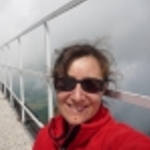 Education and previous professional experience. PhD in Chemistry from the University of Milano (2003). Degree in Chemistry from the University of Milano (2000)
Education and previous professional experience. PhD in Chemistry from the University of Milano (2003). Degree in Chemistry from the University of Milano (2000)
Senior researcher at the Institute of Polar Sciences of the National Research Council of Italy (ISP-CNR), August 2019 – present. Researcher at the Institute of Atmospheric Sciences and Climate of the National Research Council of Italy (ISAC-CNR), July 2011-July 2019. Visiting scientist at the Finnish Meteorological Institute, February 2011- March 2011. Researcher at the Joint Research Center of the European Commission, October 2007-September 2010. Researcher at the University of California San Diego, July 2005-September 2007. Researcher at the University of California Davis, February 2004-July 2005. PhD in Chemistry from the University of Milano (2003) Degree in Chemistry from the University of Milano (2000)
International activities. Editor for "Atmospheric Chemistry and Physics" (since 2013). Editor for "Aerosol and Air Quality Research" (since 2011). Guest Editor for "Atmosphere" special issue on Aerosol Mass Spectrometry (2017). Referee for scientific papers: Atmospheric Chemistry and Physics, Atmospheric Environment, Environmental Pollution, Environmental Science and Technology, Journal of Geophysical Research. Italian expert in the “Expert Group on Black Carbon and Methane” of the Arctic Council (since 2019). Working group leader for organic aerosol source apportionment of the COST Colossal project (2017-2021).
Area of scientific interest: Chemical and physical characterization of atmospheric aerosol with particular attention to the carbonaceous components, their chemical composition, microphysical properties, climate-relevant properties, and formation mechanisms. Cloud - aerosol interaction. Impact of air quality and climate change on fog formation.
Author of 58 publications in peer review journals and 5 chapters in books (h-index 21 – web of science)
Scopus - Author ID: 6602523027 ![]() http://orcid.org/0000-0002-7312-5571 WoS Researcher ID: P-1283-2014 Google Scholar
http://orcid.org/0000-0002-7312-5571 WoS Researcher ID: P-1283-2014 Google Scholar
Bando Dottorato di ricerca 37° ciclo in Scienze Polari - scadenza 21 aprile 2021
 Università Ca’ Foscari - Venezia
Università Ca’ Foscari - Venezia
Emanato il bando di concorso per l'ammissione ai Corso di Dottorato 37° ciclo in Scienze Polari. Informazioni relative alle modalità di partecipazione al concorso: www.unive.it
Versione in Inglese scaricabile. Il termine per la presentazione della domanda di ammissione è mercoledì 21 aprile 2021 ore 13.00 (ora italiana). Per informazioni sul bando inviare una mail a phd.application AT unive.it.
Antartide. Nuova call per la spedizione italiana presso la stazione Concordia 2020-2021
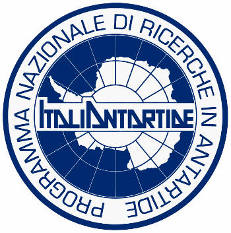 Il PNRA (Programma nazionale di ricerche in Antartide) procede annualmente alla composizione e alla formazione del gruppo scientifico-tecnico-logistico per le attività da svolgere nel continente antartico. Data la necessità di avvalersi della collaborazione di alcune figure professionali per le attività di cosiddetto Winter Over, è stato pubblicato l'Avviso di interesse per la partecipazione alla XXXVI spedizione italiana in Antartide presso la stazione Concordia nel periodo Novembre 2020-Novembre 2021.
Il PNRA (Programma nazionale di ricerche in Antartide) procede annualmente alla composizione e alla formazione del gruppo scientifico-tecnico-logistico per le attività da svolgere nel continente antartico. Data la necessità di avvalersi della collaborazione di alcune figure professionali per le attività di cosiddetto Winter Over, è stato pubblicato l'Avviso di interesse per la partecipazione alla XXXVI spedizione italiana in Antartide presso la stazione Concordia nel periodo Novembre 2020-Novembre 2021.
--->>>>>>> NUOVA SCADENZA 12 MAGGIO 2020
Barbaro Elena
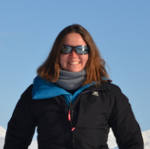 Ph.D.: Researcher at Institute of Polar Sciences-CNR (ISP), Venice, Italy;
Ph.D.: Researcher at Institute of Polar Sciences-CNR (ISP), Venice, Italy;
2013 to 2018 - Post-doctoral fellowship, Ca’ Foscari University, Venice, Italy and Institute for the Dynamics of Environmental Processes-CNR (IDPA), Venice, Italy;
2010-2012 PhD student in Chemical Sciences.
Research interests:
- Environmental chemistry; Her research is mainly focused on the investigation of chemical markers in several environmental compartments (ice, snow, aerosol, lake water, sediments) to define sources and transport processes mainly in the remote polar areas (Arctic and Antarctica).
- Development of very sensitive analytical methodsusing liquid chromatography coupled with tandem mass spectrometer (HPLC-MS/MS) and ion chromatography coupled with mass spectrometers (IC/MS) to investigate several chemical compounds at trace and ultra-trace concentration.
She has a deep experience in sample preparation in clean labs to determine organic compounds at trace and ultra-trace concentrations. She has participated in several scientific campaigns in the polar regions (Antarctica and the Svalbard Islands). Publications and bibliometrics H-index: 12 (Scopus); 41 scientific (SCOPUS) papers.
>50 poster and oral communications at scientific meetings; 2 invited oral presentations at international and national meetings National and International Appointments
2019-2015 Researcher under International Arctic Campaigns (Ny Alesund, Svalbard);
2012, 2014 Researcher under Antarctic campaigns (on-board Italica vessel and at Mario Zucchelli Station); Research projects
2018 - 2019 RCN - SSG- Spatial Distributions of Black Carbon and Mineral Dust in Air and Snow Surface Layers upon Svalbard Glaciers: participant;
2017-2019 PNRA - EvASIon - Mercer and Whillans lakes: Evolution of hydrologically Active Subglacial environments: participant;
2016-2017 RCN - SSG– Community Coordinated Snow Study in Svalbard: participant;
2012-2014 PNRA - CaBiLA: Geochemical characterization of Antarctic subglacial lakes: participant;
2012 - 2016 EU – Early Human Impact: participant
Scopus - Author ID: 46961088400 ![]() http://orcid.org/0000-0003-2639-7475 Google Scholar
http://orcid.org/0000-0003-2639-7475 Google Scholar
The Arctic Science Summit Week 2021, 19-25 March 2021 Lisboa - Portugal
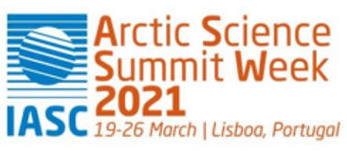 Framed by the overarching theme for the Science Conference The Arctic: Regional Changes, Global Impacts, Lisbon invites International experts on the Arctic and Indigenous Peoples to discuss the “New Arctic” and also its impacts and interactions to and with the lower latitudes.
Framed by the overarching theme for the Science Conference The Arctic: Regional Changes, Global Impacts, Lisbon invites International experts on the Arctic and Indigenous Peoples to discuss the “New Arctic” and also its impacts and interactions to and with the lower latitudes.
ASSW2021 Site
Arctic Science Summit Week 2020 Akureyri, Iceland | 27 March - 2 April 2020
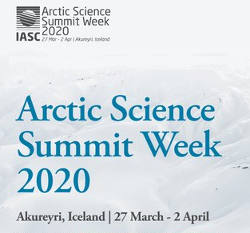 Convened by the International Arctic Science Committee (IASC)
Convened by the International Arctic Science Committee (IASC)
Hosted by the Icelandic Centre for Research and the University of Akureyri
ASSW2020 Site
Beyond EPICA Oldest Ice Core

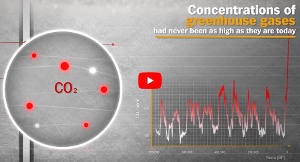 Com'era il clima più di 800.000 anni fa? Grazie al progetto OldestIce i ricercatori stanno ricostruendo la storia del clima del nostro pianeta con l’analisi del ghiaccio in Antartide. Il progetto è finanziato dall’Unione Europea. Intervista a Carlo Barbante, coordinatore del progetto. Il 1° giugno 2019 ha preso ufficialmente avvio Beyond EPICA Oldest Ice Core, finanziato dal programma di ricerca europeo Horizon 2020. Comunicato stampa CNR
Com'era il clima più di 800.000 anni fa? Grazie al progetto OldestIce i ricercatori stanno ricostruendo la storia del clima del nostro pianeta con l’analisi del ghiaccio in Antartide. Il progetto è finanziato dall’Unione Europea. Intervista a Carlo Barbante, coordinatore del progetto. Il 1° giugno 2019 ha preso ufficialmente avvio Beyond EPICA Oldest Ice Core, finanziato dal programma di ricerca europeo Horizon 2020. Comunicato stampa CNR
AGGIORNAMENTO (Settembre 2020): Annullata la campagna Beyond EPICA 2020/21
A causa delle restrizioni dovute al Covid-19, la campagna 2020/21 di Beyond EPICA è stata cancellata. La nostra priorità è mantenere l'Antartide libera dal SARS-Cov-2 virus e rendere la realizzazione del progetto la più sicura possibile. Tutte le attività in campo in Antartide saranno ridotte di un terzo e per questo motivo sarà data priorità alle attività di rifornimento della stazione Concordia e lo scambio del team per la campagna invernale. Il team Beyond EPICA tornerà al campo di Little Dome C nel 2021.
The 25th International Symposium on Polar Sciences KOPRI - May 12-13, 2020
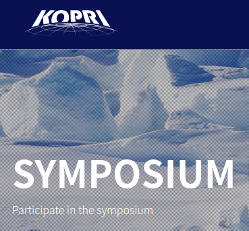 The 26th International Symposium on Polar Sciences
The 26th International Symposium on Polar Sciences
Finding solutions to global issues: Polar science and technology
May 12-13, 2020 - Korea Polar Research Institute - Incheon, Republic of Korea
The 26th International Symposium on Polar Sciences organized by Korea Polar Research Institute (KOPRI) will be held on May 12-13, 2020 in Incheon, Republic of Korea. This symposium aims to bring polar scientists together to discuss their research findings and to promote international collaborative research.
KOPRI Site
Rompighiaccio italiana Laura Bassi raggiunge il punto più meridionale della Terra (latitudine 78° 41.1006S)
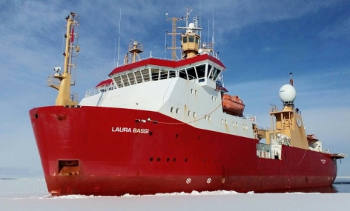 7 Febbraio 2020
7 Febbraio 2020
Il record è stato battuto nel corso di un campionamento nel Mare di Ross in Antartide, effettuato per la campagna oceanografica della 35a spedizione del Programma Nazionale di Ricerche in Antartide (PNRA), gestito da ENEA per la pianificazione e l’organizzazione logistica e dal Cnr per la programmazione e il coordinamento scientifico.
Comunicato stampa CNR
XXXV Spedizione in Antartide
Rompighiaccio Laura Bassi - Sito OGS
Physics and Chemistry of the Arctic Atmosphere
Edito da Springer un nuovo libro sull'atmosfera Artica, curato da Cladio Tomasi con Alexander Kokhanovsky, con diversi contributi dei ricercatori ISP (ISAC al momento della preparazione del volume).
Il libro presenta le conoscenze attuali di chimica e fisica dell'atmosfera artica. Particolare attenzione è rivolta agli studi sul fenomeno della foschia artica, alle nuvole troposferiche artiche, sulla nebbia artica, sulle nuvole stratosferiche e mesosferiche polari, sulla dinamica atmosferica, sulla termodinamica e sul trasferimento radiativo in relazione all'ambiente polare. I meccanismi di retroazione atmosfera-criosfera e le tecniche di telerilevamento atmosferico vengono presentati in dettaglio. Vengono anche affrontati i problemi dei cambiamenti climatici nell'Artico.
L'ISP nella spedizione oceanografica sulla piattaforma continentale dell’Australia sudoccidentale
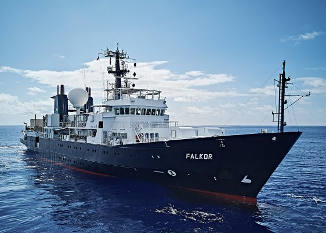 31 Gennaio 2020
31 Gennaio 2020
Ricercatori del CNR-ISMAR e CNR-ISP partecipano da gennaio 2020 ad una missione oceanografica della nave da ricerca Falkor appartenente allo Schmidt Ocean Institute. Il team internazionale comprende Paolo Montagna (CNR-ISP), che agirà come Co-Capo missione insieme a Julie Trotter dell’University of Western Australia, Marco Taviani, Federica Foglini e Alessandro Remia del CNR-ISMAR.
La campagna oceanografica FK200126 condurrà la prima esplorazione delle acque profonde nella zona sud-occidentale dell’Australia, lungo il Bremer Canyon e il Leeuwin Canyon.
Comunicato stampa CNR
Segui la crociera on line
Artico - Primo paleorecord di ghiaccio marino nel Nord Atlantico
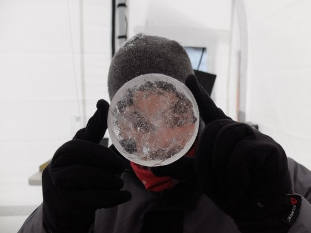 21 Gennaio 2020
21 Gennaio 2020
Studio dell’Istituto di scienze polari del Consiglio nazionale delle ricerche (CNR-ISP) pubblicato su Climate of the Past ha prodotto il primo paleorecord di ghiaccio marino nel Nord Atlantico che ha consentito di scoprirne l’evoluzione durante le variazioni climatiche degli ultimi 120mila anni.
A 120 000-year record of sea ice in the North Atlantic? Clim. Past, 15, 2031–2051, 2019
BANDO PNRA 2019
 MIUR - 17 gennaio 2020
MIUR - 17 gennaio 2020
Decreto Direttoriale n. 20 del 17-1-2020
PNRA 2019 Disciplina delle procedure per la presentazione di proposte di progetti di ricerca rivolte ad approfondire le conoscenze in Antartide.
Scarica e visiona il BANDO PNRA 2019
Scadenza: ore 12 del 27 febbraio 2020
SESS Report 2019
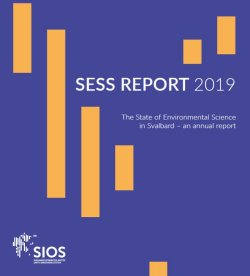 14 Gennaio 2020
14 Gennaio 2020
Il rapporto dello stato della scienza ambientale alle Svalbard (SESS) è stato rilasciato durante la settimana polare notte (SIOS Polar Night Week) a Longyearbyen, gennaio 2020. È il secondo numero di una serie annuale di relazioni pubblicate da SIOS. La relazione di quest'anno comprende le recensioni dei dati e delle attività esistenti, sintesi dei dati eaggiornamenti dei capitoli dell'anno scorso. Si tratta di una descrizione unica delle attività e della collaborazione in corso, nonché raccomandazioni per il futuro nella ricerca delle Svalbard.
Scoping Workshop: Toward Implementing an Antarctic RCC-Network - Bologna, Italy, 7-9 October 2019
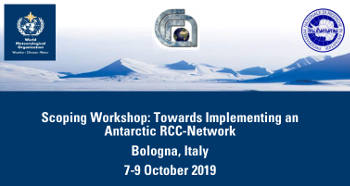 Scoping Workshop: Toward Implementing an Antarctic RCC-Network
Scoping Workshop: Toward Implementing an Antarctic RCC-Network
Bologna, Italy, 7-9 October 2019
The World Meteorological Organization (WMO) is fostering the establishment of Regional Climate Centres (RCCs) for the Polar Regions.
Antartide - Aggiornamenti dal progetto europeo Beyond EPICA - Oldest Ice Core
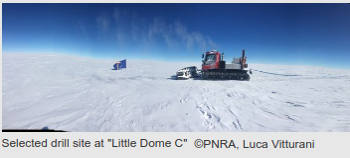 23 Dicembre 2019
23 Dicembre 2019
Sondaggio geofisico ad alta risoluzione conferma il sito per il carotaggio profondo del progetto europeo Beyond EPICA - Oldest Ice Core: 1.5 Myr of greenhouse gas - climate feedback. Esperti di 12 istituzioni provenienti da 10 paesi europei, coordinati da Carlo Barbante dell’Università Ca’ Foscari Venezia e dell’Istituto di Scienze Polari del Consiglio nazionale delle ricerche (CNR-ISP), hanno confermato il sito per il carotaggio in Antartide Orientale.
Comunicato stampa CNR
Beyond EPICA - Oldest Ice Core
Ricercatrice CNR nominata chair di una flagship della Ny-Ålesund Science Managers Committee (NySMAC)
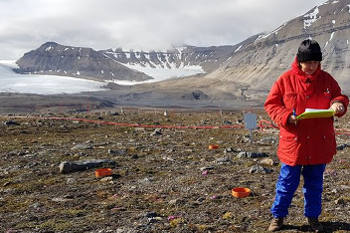 14 Novembre 2019
14 Novembre 2019
Nel corso del meeting della Terrestrial Ecology Flagship tenutosi ad Oslo il 5 novembre 2019 nell’ambito della Svalbard Science Conference, Angela Augusti ricercatrice dell'Istituto di ricerca sugli ecosistemi terrestri (CNR-IRET) è stata nominata coordinatrice della suddetta flagship.
Comunicato stampa CNR
Mostra Artico. Viaggio interattivo al Polo Nord, 15 Gennaio - 12 Febbraio 2020 - Sede CNR - ROMA
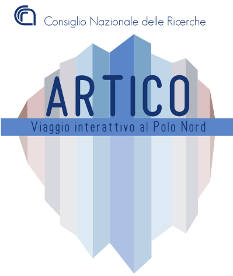 La mostra attraverso installazioni fisiche e multimediali, esperimenti interattivi, apparecchiature scientifiche, ricostruzioni in scala, documenti, oggetti e immagini suggestive guida il pubblico alla scoperta dell’Artico, delle sue peculiarità e dei fenomeni osservati.
La mostra attraverso installazioni fisiche e multimediali, esperimenti interattivi, apparecchiature scientifiche, ricostruzioni in scala, documenti, oggetti e immagini suggestive guida il pubblico alla scoperta dell’Artico, delle sue peculiarità e dei fenomeni osservati.
Il percorso della mostra prosegue mettendo a fuoco le principali attività di ricerca che l’Italia conduce in Artico e in particolare a Ny-Ålesund, nelle Isole Svalbard, dove il Cnr gestisce la stazione di ricerca 'Dirigibile Italia'. Infine si illustra la struttura organizzativa degli organismi internazionali, di cui anche l’Italia fa parte, che gestisce la programmazione scientifica e politica in Artico. La mostra, che si avvale del contributo di vari Istituti Cnr, è un’ottima occasione per capire le attività dei ricercatori italiani che operano in Artico.
EAIIST (East Antarctic Int'l Ice Sheet Traverse)
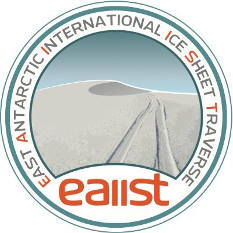 3 Dicembre 2019
3 Dicembre 2019
Una 'traversa' sul plateau in Antartide per stimare l'aumento del livelo dei mari
Dal 5 dicembre 2019 al 25 gennaio 2020, una squadra composta da scienziati francesi del Cnrs, dell’Università Grenoble Alpes e da scienziati italiani del Cnr e dell’Ingv percorrerà 1318 km tra andata e ritorno in mezzo al plateau dell’Antartide, su una traversa organizzata dall’Istituto Polare Francese (Ipev) con la collaborazione del Programma nazionale di ricerche in Antartide (Pnra).
Tra i ricercatori italiani sarà presente in campo Andrea Spolaor (CNR-ISP) .
Comunicato stampa CNR
EAIIST
Antartide: al via la 35a spedizione italiana (2019-2020)
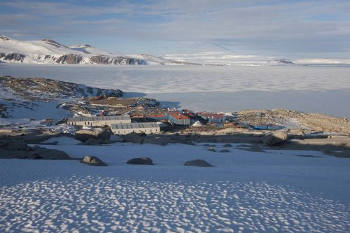 23 Ottobre 2019
23 Ottobre 2019
Gestita dall’ENEA per la pianificazione e l’organizzazione logistica e dal CNR per la programmazione e il coordinamento scientifico, la missione ha inizialmente riattivato i servizi e preparato la pista di 3 km sul pack marino per l’atterraggio di aerei intercontinentali.
Impiegata per la prima volta l’unica nave italiana in grado di operare nelle aree polari, la Laura Bassi, acquisita dall’Ogs di Trieste, che effettuerà una campagna oceanografica da Lyttelton a Baia Terra Nova.
Comunicato stampa CNR
BANDO PRA 2019 - Scadenza 6 Dicembre 2019
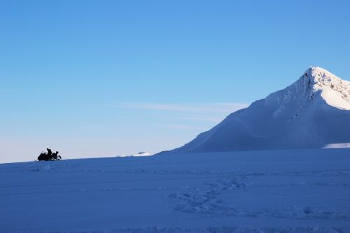 Programma di Ricerche in Artico 2019-2020:
Programma di Ricerche in Artico 2019-2020:
al via il bando per la presentazione di proposte
Disciplina delle procedure per la presentazione di proposte di progetti di ricerche specifiche a rivolte ad approfondire le conoscenze in Artico.
Scadenza per la presentazione delle domande: 6 dicembre 2019 h 12:00
 Ministero dell'Universita e Ricerca
Ministero dell'Universita e Ricerca
Programma Ricerche Artico
Programma Nazionale di Ricerca in Antartide
 Ministero degli Affari Esteri e della Cooperazione Internazionale
Ministero degli Affari Esteri e della Cooperazione Internazionale
L'Italia e l’Artico
L’Italia e l’Antartide
CNR-ISP
National Research Council
Institute of Polar Sciences
c/o Scientific Campus - Ca' Foscari University Venice - Via Torino, 155 - 30172 VENEZIA MESTRE (VE)
Phone: +39 041 2348547 - E-mail: protocollo.isp AT pec.cnr.it
Fax: +39 041 2348 549 - Codice Fiscale: 80054330586 - P.I.:02118311006
Unless otherwise indicated, the content of this site is licensed : Attribution Non Commercial Share Alike 4.0 International (CC BY-NC-SA 4.0)
Privacy policy e Cookie policy - Transparent administration (CNR)






